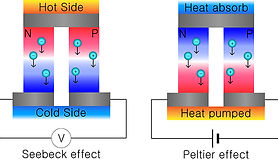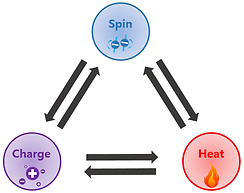Thermoelectrics
We are developing thermoelectric materials that are non-toxic and inexpensive, and that work at room temperature to medium temperature (300~900 K). These materials can be exploited to harvest energy from waste heat such as the exhaust of automobiles and industries.
Spin thermoelectrics
Spin thermoelectrics is the study of interactions among heat, electrons, and magnetism in solids. This field was initiated with the discovery of the spin-Seebeck effect (SSE) in 2008 and has evolved into diverse research topics that have led to the discovery of novel effects, such as spin-dependent Seebeck effect, anomalous Nernst effect and spin-Peltier effect.
Magnon based logic device
We are aiming to develop a new concept of dissipationless-logic device, dubbed magnon-based magnetic random access memory (magnon-MRAM) as a future storage class memory (SCM). To accomplish the goal, we are investigating fundamentals of the ‘spin wave (magnon)’ and spin-mediated transport effects in magnets and topological materials.
Device and application
We are focusing on efficient heat management for thermal applications by using thermoelectric materials or thermoelectric modules; examples include a stretchable thermoelectric cooler, and cooling of localized and transient heat.
Hydrogen production
Carbon-free hydrogen production is of critical importance in storing renewable energy as a useful fuel or chemical precursor. Our sub-group has developed a thermochemical hydrogen-production process in the materials and systems perspectives.
Syngas production
Syngas, a mixture of hydrogen (H2) and carbon monoxide (CO), has been considered as an alternative energy carrier to replace fossil fuels. Also, syngas as an initial material can be converted to various hydrocarbon chemicals.












